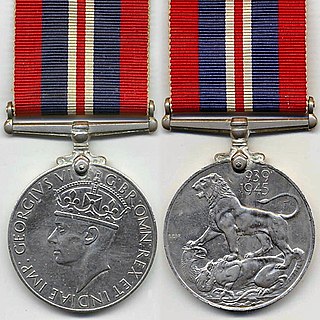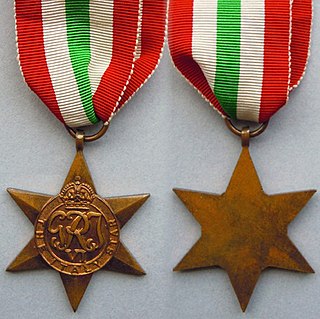Prior to 1956 the Sri Lankan armed forces received honours of the United Kingdom, including military decorations and campaign medals. Since 1981 Sri Lanka introduced its own honours system. This has resulted in a new system of Sri Lankan honours, military and police awards, and campaign medals. [1]
To be mentioned in dispatches describes a member of the armed forces whose name appears in an official report written by a superior officer and sent to the high command, in which their gallant or meritorious action in the face of the enemy is described.
The Ceylon Defence Force (CDF) was established in 1910 by the Ceylonese legislation Ceylon Defence Force Ordinance, which reformed the Ceylon Volunteer Force (CVF) that existed previously as the military reserve in the British Crown colony of Ceylon. At the time of forming it was only a reserve force but soon developed into a regular force responsible for the defence of Ceylon. The CDF was under the command of the General Officer Commanding, Ceylon of the British Army in Ceylon if mobilised. However mobilisation could be carried out only under orders from the Governor.

The Pacific Star is a military campaign medal instituted by the United Kingdom in May 1945 for award to British and Commonwealth forces who served in the Pacific Campaign from 1941 to 1945, during the Second World War.
An overview of South African military decorations and medals, which form part of the South African honours system.
The following is the Canadian order of precedence for decorations and medals. Where applicable, post-nominal letters are indicated.
British campaign medals are awarded to members of the British Armed Forces, Allied forces and civilians participating in specified military campaigns. Examples include the Defence Medal, for homeland defence in World War II, and the Atlantic Star for World War II sea service in the Atlantic.

The War Medal 1939–1945 is a campaign medal which was instituted by the United Kingdom on 16 August 1945, for award to citizens of the British Commonwealth who had served full-time in the Armed Forces or the Merchant Navy for at least 28 days between 3 September 1939 and 2 September 1945.

The 1939–1945 Star is a military campaign medal instituted by the United Kingdom on 8 July 1943 for award to British and Commonwealth forces for service in the Second World War. Two clasps were instituted to be worn on the medal ribbon, Battle of Britain and Bomber Command.

The Burma Star is a military campaign medal, instituted by the United Kingdom in May 1945 for award to British and Commonwealth forces who served in the Burma Campaign from 1941 to 1945, during the Second World War.

The Italy Star is a military campaign medal, instituted by the United Kingdom in May 1945 for award to British Commonwealth forces who served in the Italian Campaign from 1943 to 1945, during the Second World War.

The France and Germany Star is a military campaign medal, instituted by the United Kingdom in May 1945 for award to British Commonwealth forces who served in France, Belgium, Luxembourg, the Netherlands or Germany and adjacent sea areas between 6 June 1944 and 8 May 1945, during the Second World War.

The Sri Lankan Armed Forces award medals and their associated ribbon bars in recognition of various levels of service, personal accomplishments and commemorative events while a regular- or volunteer serviceperson is a member of the Sri Lanka Army, Sri Lanka Navy and the Sri Lanka Air Force. Together with military badges, such awards are a means to outwardly display the highlights of a serviceperson's career.

The Parama Weera Vibhushanaya (PWV) is Sri Lanka's highest military decoration, awarded for acts of exceptional valour in wartime. Parama Weera Vibhushanaya translates as the ""Decoration of Supreme Heroism", and the award is granted for "individual acts of gallantry and conspicuous bravery of the most exceptional order in the face of the enemy". Corporal Gamini Kularatne, was the first recipient.As of January 2021, the medal has been awarded 31 times, of which all were posthumous and arose from actions in the Sri Lankan Civil War. Of the 31 awardees, 28 have been from the Sri Lanka Army, two have been from the Sri Lanka Navy and one has been from the Sri Lanka Air Force.
Prior to 1946 the New Zealand armed forces received honours of the United Kingdom, including military decorations and campaign medals. Since the end of World War 2 there have been constant moves towards an independent New Zealand honours system. This has resulted in a new system of New Zealand honours, gallantry and bravery awards, and campaign medals.

The current decorations and medals of the Sri Lanka Police were adapted from those of the Dominion of Ceylon in 1972 when Sri Lanka became a republic.

The Sri Lanka Armed Forces is the overall unified military of the Democratic Socialist Republic of Sri Lanka encompassing the Sri Lanka Army, the Sri Lanka Navy, and the Sri Lanka Air Force; they are governed by the Ministry of Defence (MoD). The three services have around 346,700 active personnel; conscription has never been imposed in Sri Lanka. The Sri Lanka Coast Guard is also under the purview of the Ministry of Defence and its members are all from the Sri Lanka Navy.
Major General Deshamanya Alexander Richard Udugama, MBE was a Sri Lankan military leader, politician and diplomat. Former Army Commander (1964–1966), he was elected as Member of Parliament for Matale from 1970 to 1977 and served as Sri Lankan Ambassador to Iraq from 1979 to 1982. He was accused of an alleged coup d'état in 1966.
Colonel Sooriyaratne Douglas Ratwatte, ED was a Sri Lankan army officer. He was the Commandant of the Volunteer Force.